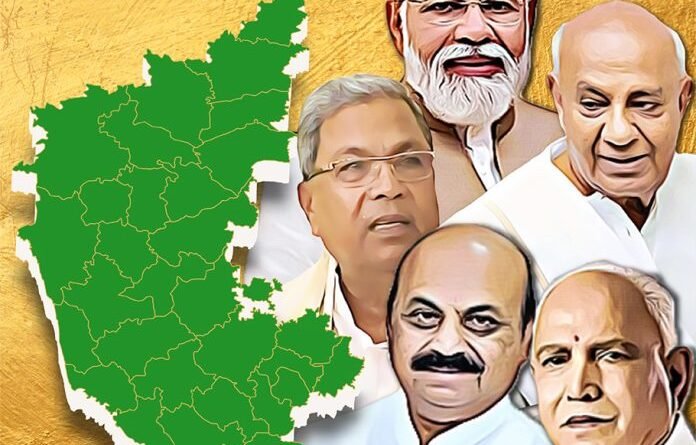Karnataka’s electoral landscape is volatile, muddied, and unpredictable
The polls have ruptured the political and social harmony in the state, starkly exposing its faultlines
A month from now, voters in Karnataka will be heading to the polling booths to elect a new government. But what is apparent is the proverbial can of worms it has opened in the run-up to the contest.
The leaders of major political parties — BJP, Congress and JD(S) — are experiencing major headaches, as internal squabbles have broken out over ticket distribution. The disease has even spread to a leading political family, which is facing revolt within.
The unprecedented churning on the eve of an otherwise issueless election has made the contest unpredictable. Alongside, the polls have ruptured the political and social harmony in the state, starkly exposing its faultlines. The discourse has gone beyond traditional politics concentrated around two major social groupings led by the Lingayats and the Vokkaligas.
Chief Minister Basavaraj Bommai’s move to take away 4 per cent reservation for Muslims under the Socially and Economically Backward category and distribute it equally between the Lingayats and Vokkaligas has pleased nobody. The Muslims, already pushed to a corner following controversies over hijab and halal meat, find themselves stripped of legal protection for their social empowerment. This has even angered a section of Lingayats and Vokkaligas, who have expressed their dissatisfaction over receiving benefits at the cost of marginalised Muslims.
The Dalits, who constitute 17 per cent of the state population, are also upset as they find the internal allocations within 2 per cent enhanced reservation for the community from 15 per cent to 17 per cent unacceptable.
BJP’s ‘social engineering’ has also not satisfied the Panchamasalis, who constitute 60 per cent of Lingayats and have been asking for higher reservation but were convinced to call off their protests after the 2 per cent hike in their quota.
There are a number of other social groupings that are unhappy with the reservation benefits. Though the social churn is partly due to competitive desire among various communities to come up in the caste hierarchy through reservations in education and jobs, the BJP’s aggressive push for cornering support has raised expectations.
The BJP has also been attempting to woo various communities by recognising their local heroes and giving them identities, by installing statues, renaming places and recalling their past memories of valour and wisdom to bring them under a common Hindutva banner. The renaming is also aimed at erasing past memories associated with a particular ideology and giving new names associated with the current regime. Besides, all political parties have begun to distribute ‘gifts’ to voters, a tradition more followed in the neighbouring Tamil Nadu.
Ticket squabbles
While voter appeasement is being pursued aggressively by all parties, what must worry them is the serious flights within over ticket distribution. The BJP is facing rebellion in three dozen constituencies. There are at least five contestants in each seat where the BJP is sure of winning. As soon as the Congress announced its second list of candidates, some of its leaders began protesting, even threatening to leave the party. Former MLC Raghu Achar, who was denied the Chitradurga assembly seat, announced joining the JD(S).
SK Basavarajan, another aspirant for the same seat, threatened to leave the party. K Radhakrishna, a leader from Mandya who was denied a ticket, may talk to his cadres before taking a decision on quitting the party.
Chief ministerial favourite of the Congress party, Siddaramaiah, has his set of worries. After much dilly-dallying, he decided to contest from the Varuna assembly seat, but the BJP promptly put a spanner in the works by promising a strong candidate against him with an objective of defeating him. If not, at the least, they would succeed in tying him down to his constituency.
It is not just Siddaramaiah who is worried. Sidelined Lingayat leader BS Yediyurappa of the BJP, too, is perplexed. In 2018, the former Chief Minister wanted his son Vijayendra to contest from Varuna, but the BJP high command denied him the ticket, causing serious heartburn. Now, the party is keen that Vijayendra contests against Siddaramaiah but the father is not ready — he does not want his son to be made a ‘scapegoat’. He would like his son to be fielded from Shikaripura, his home turf.
Also read | Karnataka polls: Rift in Deve Gowda family over Hassan constituency
While Congress and BJP leaders are busy fire-fighting, former Prime Minister and JD(S) patriarch Deve Gowda is facing a different crisis. The 90-year-old is now forced to mediate between his sons Revanna and Kumaraswamy. This is because Bhavani Revanna, wife of the elder brother, is keen to contest from Hassan, a family pocket borough. Kumaraswamy has made it clear that the seat would go to a “deserving party worker”. Bhavani’s sons Prajwal Revanna and Suraj Revanna are MP and MLC, respectively, from the constituency.
Cows and milk
Besides the interpersonal fights, the BJP is facing a political storm over the entry of Amul milk cooperative into the state, and the recent arrest of a cow vigilante accused of murdering a legitimate cattle transporter. The state BJP unit, while proudly touting the ‘Gujarat Model’ of development, had cited Amul’s success and said its entry would boost the sales of milk and milk products in Karnataka.
What was forgotten in the ensuing hype was that the Amul brand was created by Verghese Kurian, an enterprising social entrepreneur often described as the father of India’s ”white revolution”. His stint preceded the BJP’s much-touted ‘Gujarat model’ of development.
Union Home Minister Amit Shah, during one of his earlier visits to Karnataka, had talked of cooperation between Amul and Nandini, a state-based milk cooperative and the second largest such institution in the country. There were howls of protests as farm leaders and the Opposition claimed that this would sound the death knell for scores of cooperatives and local milk producers.
Amul, in an aggressive campaign, had put out posters in Bengaluru announcing its entry. The state government chose to write ‘Dahi’ in Hindi on yoghurt packets produced by Nandini. This drew immediate reaction from the netizens. The hashtags “Go back Amul” and “Save Nandini” began to go viral as Opposition leaders suspected a conspiracy to “kill the local” brand which they described as the “Sanjivini” for the farmers. The controversy reached Karnataka at a time when milk production, hit by lumpy skin disease, had fallen from a daily collection of 99 lakh litres to just 71 lakh litres a day.
The announcement of the Shiv Sena-led Maharashtra government to extend its health insurance scheme to people living in the border districts of Karnataka further infuriated local sentiments. The Opposition has mounted a scathing attack on the Basavaraj Bommai government, terming it as ‘weak’ and ‘ineffective’, unable to withstand pressures from Maharashtra.
Perception battle
The BJP is also fighting a battle of perception, as Bommai is seen as an ineffective administrator. The charges of ‘40 per cent commission’ in government contracts seem to stick. Though the BJP will fall back on its ultimate trump card — the image of Prime Minister Narendra Modi — it is leaving no stone unturned to woo the electorate.
Modi and Amit Shah, who make frequent visits to the state, have been relentlessly announcing big infrastructure schemes to dazzle voters. The eagerness of the BJP to impress Karnataka voters cannot be dismissed as signs of desperation. The party, in its post-2014 avatar, has been relentlessly working as an election machine with a single objective of scoring a win.
The clamour for tickets among aspirants, infighting in parties, the restlessness of major leaders across the political spectrum, and the unease among communities and social groups to corner benefits certainly indicate a certain shift in the state politics which in the past was more measured. These ills, trending over the years, have now consolidated on the eve of the upcoming election. Post poll defections and allegations of money playing a major role in leaders shifting their loyalties have made the elections fluid and therefore lucrative.
Intense electoral noise has made the outcome too close to call. Yet, what could be said safely is that the Congress enjoys an edge over its main rival, the BJP. The party so far has managed to present a united face with rivals Siddaramaiah and DK Shivakumar refraining from making any embarrassing moves. Anti-incumbency and the uninspiring leadership of Bommai are certainly helping them.
The controversies over language and attempts at social rejig have muddied the BJP’s campaign. Since the political preferences in the state vary from region to region, the attempts at religious polarisation have had mixed results. Though the BJP is at the receiving end, it can take solace from the fact that it’s not alone in facing a crisis; its opponents are equally at sea. And that defines the complex nature of politics in the state today.
Source: The Federal




